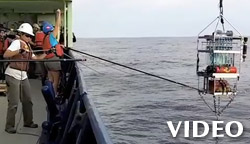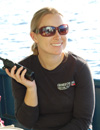

Despite the most thorough preparations, sometimes things do not go as planned. In this video you will see two recoveries of the SID-ISMS instrument, one that went perfectly and one that hit a bit of a snag. SSSG Allison Heater shows what happened.
VIEW VIDEO »

Today's Weather
Sunny
Lat: 35.23 N
Long: 21.47 E
Air temp: 17.5°C, 63.5°F
Bar. Pressure: 1025.2 mbar
Humidity: 62%
Sea surface temp: 19.8°C, 67.7°F
Winds: WSW; 4.3 knots
Visibility: unlimited

Greek Origin
Word of the Day:
Galley
from “galea” meaning a low, flat sailing vessel with one deck; it gained its current meaning around 1750
Keeping us up and running
December 3, 2011 (posted December 4, 2011)
by Cherie Winner
You can count on it: any time a scientist on the cruise has a problem he or she can’t figure out, whether it’s with a map or an instrument or a computer program, the call goes out: “Hey, Allison!” or “Catie, can you help?”
Allison Heater and Catie Graver are this cruise’s two SSSGs, or Shipboard Scientific Services Group technicians. They are members of the ship’s crew who spend their days (and nights) solving problems for the Science party. They also keep the Captain informed about how the science mission is going—how the equipment is performing, any glitches that occur, and how those might affect the ship’s ability to get the job done. They even do deck work like helping to deploy and recover instruments and vehicles. Simply put, the research would not get done without them.
Each SSSG works on a WHOI research ship six to eight months a year. They have the rest of the time off, which helps them rest up for the next set of cruises. You’d need to rest up, too, if you worked their schedule.
Officially, SSSGs work 12-hour watches (shifts), seven days a week while on a cruise, but as Catie says, “Basically, if you need us, we’re working. It depends on what the science operations are. If they’re going on around the clock, we’re on around the clock.”
Watch Allison in a video about SID-ISMS recoveries, and hear from Catie in the interview linked below.
Down to basics
There’s something even more basic than great tech support, and that is great food. People on a research cruise get VERY hungry. They’re working 16- to 20-hour days and don’t stop to think about food until all of a sudden they realize they’re ravenous.
Lucky for them, R/V Atlantis has a superb galley (ship’s kitchen) staff that keeps the delicious dishes coming. If you’ve been reading our menus for the day, you’ve seen what I’m talking about. If you haven’t been reading our menus, take a look. Sometimes we have so many good things to choose from that it can be hard to decide. The best part is, you don’t have to choose; you can have some of everything!
The men responsible for all the deliciousness on this cruise are Steward Larry Jackson and Cook Mark Nossiter, assisted by mess attendant Aleksandr Rossinskiy. (The galley crew, like the SSSGs, rotate home every few months.) Larry and Mark do the cooking, and each has developed his own favorite recipes and styles of cooking. “That keeps it from getting stale,” says Mark. They take turns with what meals they cook. One makes breakfast and lunch and the other makes dinner. The next day, they switch.
Aleksandr washes the dishes, keeps the mess (dining room) clean, and offers a smile and encouragement when we drop off our plates and trays. “Did you find the dragon today?” he asks after every Jason dive.
As Steward, Larry is responsible for planning the meals and ordering supplies. Whenever he can, he obtains foods from the ports where they dock. You may have noticed we are enjoying many dishes that include feta cheese. We also have plenty of Greek olives and lamb. The other night Larry tried a new recipe: Greek stuffed chicken, which was thinly sliced chicken breast rolled around spinach, feta cheese, onions, garlic, salt, and pepper, and then baked. I’m getting hungry just thinking about it!
Working long, hard hours is a lot easier knowing there is a wonderful meal waiting for you at the end of the day (or night). And one of these days, we just might find the dragon!
Read the new interview:
 Catie Graver: Catie Graver: Catie Graver is one of the two Shipboard Scientific Services Group technicians (SSSGs) on the cruise. She studied Biology and Oceanography at the University of Southern California. She grew up in that area and still lives there—when she’s not on the ship. Read the interview »
[ Previous update ] [ Next update ]
[Back
to top]
|
